General News
Nigeria government's audit removes nearly 24,000 non-existent workers
The Nigerian government has removed nearly 24,000 workers from its payroll after an audit revealed they did not exist, the Finance Ministry has said.
The move has enabled a monthly saving of around $11,5m (£8m).
The audit is part of an anti-corruption campaign by President Muhammadu Buhari, who took power last year.
Corruption and mismanagement have long been a challenge to Nigeria's growth, and the government has promised to cut costs to face an economic slowdown.
Nigeria is Africa's biggest economy and the continent's top oil producer, and its finances are under strain due to the recent collapse in oil prices.
The country has also faced rising inflation, a stock market slump and the slowest pace of economic growth in more than a decade.
Is corruption Nigeria's biggest challenge?
The audit started in December used biometric data and a bank verification number to identify holders of bank accounts into which salaries were being paid, Reuters news agency reports.
This process allowed the identification of some workers who were receiving a salary that did not correspond to the names linked to the bank accounts.
Nigeria's economy
- Africa's largest economy, biggest oil producer and most populous nation
- Oil-rich, but facing worst economic crisis in years after falling oil prices
- 62.6% of its 170 million population live in poverty
- Average annual earnings - $1280 (£850)
Source: UN
It also revealed that some employees were receiving salaries from multiple sources.
Some 23,846 non-existent workers were removed from the payroll, an adviser to the finance minister was quoted by Reuters as saying.
Periodic checks and electronic audit techniques will be periodically carried out to prevent new frauds, the ministry said.
Officials have said the savings resulted from the anti-corruption measures will help the country tackle its crisis and prevent job cuts.
Source: bbc.com
- Read more
-
01/Mar/2016
Nigeria's ex-Interior Minister Abba Moro charged over stampede
Nigeria's ex-interior minister has been charged with fraud over a botched recruitment drive, which resulted in stampedes that left 20 people dead.
Abba Moro led a scheme which encouraged young graduates to apply for jobs in the immigration ministry in March 2014.
Stadiums, which were being used as test centres, were overwhelmed by huge crowds of people turning up to apply.
Mr Moro has pleaded not guilty to his role in an alleged $2.5m (£1.8m) fraud, involving missing application fees.
There is a high level of unemployment in Nigeria, especially among young people.
Court papers filed by the Economic and Financial Crimes Commission (EFCC) allege that more than 675,000 people were defrauded by the scheme, which required them to pay a $6 (£3.50) application fee to take the initial recruitment test.
The case has been adjourned until 2 March.
On 15 March 2014 deadly stampedes occurred at stadiums in the Nigerian cities of Abuja, Benin and Port Harcourt, as well as a school in Mina city, as people scrambled to apply for the new jobs.
Many Nigerians online have been commenting on the irony that a former minister in charge of the country's prisons is facing a lengthy stint behind bars if he is found guilty.
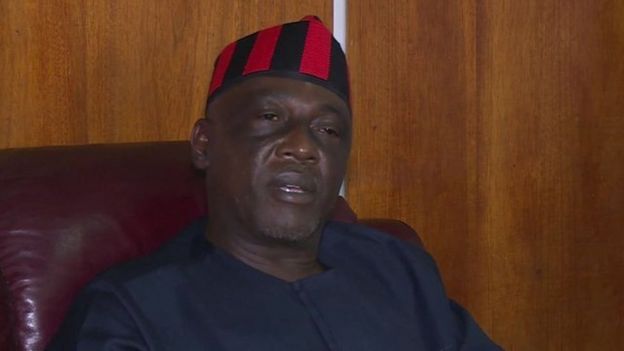
At the time, Nigeria's interior minister rejected calls for him to step down and initially refused to accept any responsibility for the disaster.
He blamed the officials in charge of the stadium for the deaths, as well as the job seekers themselves.
Source: bbc.com
- Read more
-
01/Mar/2016
Somalia's al-Shabab killed '180 Kenyan troops' in el-Ade
At least 180 Kenyan troops were killed when al-Shabab attacked their base last month, Somalia's president has said.
Kenya's army said the number was untrue, but again refused to give its own casualty figures for the assault in the southern Somali base of el-Ade.
The Islamist militant group said it had killed about 100 Kenyan troops.
If it is confirmed that 180 troops were killed, it would be al-Shabab's deadliest assault since it was formed nearly a decade ago.
Its previous most deadly attack was the killing of 148 people in the day-long assault on Garissa University College in north-eastern Kenya last April.
Somalia's President Hassan Sheikh Mohamud gave the death toll of 180 in an interview with a Somali television station, while defending his attendance at a memorial for the soldiers in Kenya.
Some Somalis accused him on social media of showing greater concern for the killing of Kenyans than his own nationals.
President Mohamud said it was important to pay tribute to the troops killed in el-Ade, which is in Somalia's south-western region of Gedo.
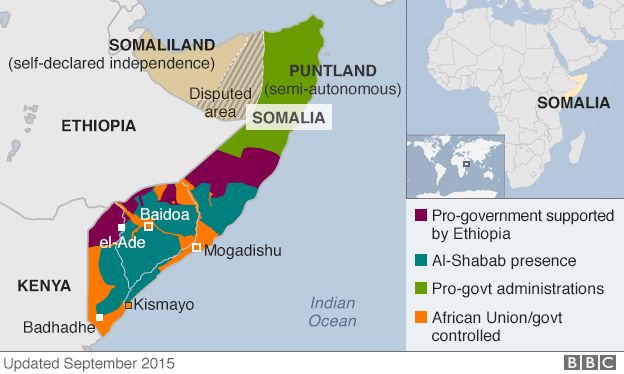
"When 180 or close to 200 soldiers who were sent to us are killed in one day in Somalia, it's not easy," he told Somali Cable TV.
"The soldiers have been sent to Somalia to help us get peace in our country, and their families are convinced that they died while on duty," he added.
'Counted bodies'
Kenyan army spokesman David Obonyo said the Somali president's information was untrue.
"Ask the source of the information to clarify it. Maybe he knows his sources," he told the BBC.
"Secondly, we should stop trivializing the dead. They are not mere statistics. They ought to be treated with honour and respect," Col Obonyo added.
Analysis: Tomi Oladipo, BBC Africa security correspondent
The el-Ade attack was hugely embarrassing for Kenya, and it is not surprising that it has rejected the Somali president's figure without giving its own. Kenya's government possibly fears that confirming a high death toll would fuel doubts among Kenyans about its military presence in Somalia.
It is unclear where Mr Mohamud got the figure from, and whether he had had intentionally disclosed it, something that could strain diplomatic relations with Kenya.
Kenya's military is clearly upset with him, but it has previously said that a company-sized battalion, usually made up of 100 to 250 men, was targeted by the militants.
And there is no doubt that this was the bloodiest attack on Kenyan troops since they crossed into Somalia in 2011, even if the exact death toll remains unclear.
The Kenyan army has sought revenge for the attack, carrying out a series of air strikes against suspected al-Shabab bases in southern Somalia, even saying that it has killed the group's intelligence chief, a claim the militants deny.
Mr Mohamud's figure is similar to that a community leader in el-Ade gave to the BBC Somali service after the attack on 15 January.
He had counted about 190 bodies, he said.
It is unclear why al-Shabab put the number of killed at about 100, but one possibility is that it excluded ethnic Somalis who were Kenyan soldiers, correspondents say.
After the attack, Kenya said the bombs used by al-Shabab were three times more powerful than those used by al-Qaeda in the 1998 US embassy attack in the capital, Nairobi, which left 224 people dead.
Its troops withdrew from el-Ade 11 days after the attack.
Kenya has about 4,000 troops in the 22,000-strong African Union force battling al-Shabab, which is part of al-Qaeda, in Somalia.
Source: bbc.com
- Read more
-
25/Feb/2016
Uhuru Kenyatta: Kenyans are 'experienced thieves'
Kenyans are "experienced in stealing and perpetuating other crimes", the president has said, during a state visit to Israel.
Uhuru Kenyatta added that Kenya was "20 times more wonderful" than Israel, but "all we ever do is complain".
Kenyans were also abusers, and promoted tribalism, he said, in an address to Kenyans living in Israel.
Mr Kenyatta has been accused of failing to do enough to curb corruption and of stirring up ethnic violence.
His comments were seen as an attempt to encourage Kenyans to develop their country, like Israel, says the BBC's Wanyama Chebusiri in Kenya's capital, Nairobi.
He seemed to question why Kenya was lagging behind, and had to even learn about irrigation from a desert country, our correspondent adds.
However, many Kenyans believe that the president's speech was just rhetoric, and he was not serious about tackling corruption or ethnic divisions in the East African state, our reporter says.
They complain that ethnicity determines whether they get government jobs, and bribery and corruption are endemic in government, he adds.
Mr Kenyatta was accused by the International Criminal Court (ICC) of crimes against humanity for allegedly inciting ethnic violence after elections in 2007, in which more than 1,200 Kenyans were killed.
But the case was dropped in 2014 after the prosecutor's office said it did not have enough evidence against him.
He always denied the charges.
Source: bbc.com
- Read more
-
25/Feb/2016
Apple asks court to reverse FBI iPhone order
Apple has asked a US court to overturn an earlier ruling ordering the company to help the FBI break into a phone used by one of the San Bernardino killers.
In court papers Apple says law enforcement authorities are seeking "dangerous powers" and the move violates its constitutional rights.
The FBI and White House have said the request is limited to one iPhone.
But Apple says the software needed to comply with the FBI's request "simply does not exist".
Instead Apple says it would have to create a new version on the iPhone operating software, containing a back door to the device's encrypted data.
It argues that the lower court did not have the authority to force Apple to do that.
Apple also says no court had ever forced a company to weaken the security of its products to gain access to personal individual information.
"This case is about the Department of Justice and the FBI seeking through the courts a dangerous power that Congress and the American people have withheld," the filing said.
Analysis - Dave Lee, BBC North America technology reporter
In appealing to the American public, there are numerous boxes you can tick to quickly gain support; strings that tug at the mind of almost every person living in this country.
In this case, the FBI went with fighting against terror, and the need to beat the so-called Islamic State. Few would disagree with that motive, and even Tim Cook has acknowledged the compelling moral argument for unlocking the phone.
But if there's one things Americans worry about more than terrorists, it's the erosion of their constitutional rights. In Apple's court motion on Thursday, the company ticked the biggest box of all: freedom of speech.
The code it writes, the company argues, is the company's speech, it's expression.
Forcing it to write code and create a "GovtOS" - a play on iOS, the software that powers the iPhone - would be forcing Apple to write code it disagreed with, the company says.
It may be the argument that tips the balance in the court of public opinion.
Apple's boss hits back at FBI conduct
Bill Gates calls for terror data debate
Apple v the FBI - a plain English guide
'Hardest question'
On Thursday FBI director James Comey, said the government's dispute with Apple was, "the hardest" he had faced in government.
Testifying before congress Mr Comey said: "This is the hardest question I have seen in government and it's going to require negotiation and conversation."
The row between Apple and the FBI blew up last week when the bureau asked the electronics firm for help to unlock the smartphone of Syed Rizwan Farook - who along with his wife killed 14 people in December 2015.
So far, Apple has refused to unlock the phone.
In an interview aired yesterday with US TV network ABC, Apple boss Tim Cook said the FBI was asking it to make "the software equivalent of cancer".
He added: "Some things are hard and some things are right. And some things are both. This is one of those things."
Constitutional questions
Apple has argued that the FBI's request violates its constitutional right to freedom of speech, because a 1999 court case ruled that computer code is considered speech.
By forcing Apple to create a new code the FBI was violating a constitutional right, the company said.
Apple's attorney, Bruce Sewell will testify before Congress on 1 March about the encryption case.
Tech leaders, including Google's boss, and Apple customers have praised the company for standing up to the FBI.
Apple supporters rallied in front of the company's stores on Tuesday to show their support.
A Department of Justice court filing from February accused Apple of refusing to help to boost its "marketing strategy".
Source: bbc.com
- Read more
-
25/Feb/2016
India caste unrest: Ten million without water in Delhi
More than 10 million people in India's capital, Delhi, are without water after protesters sabotaged a key canal which supplies much of the city.
The army took control of the Munak canal after Jat community protesters, angry at caste job quotas, seized it.
Keshav Chandra, head of Delhi's water board, told the BBC it would take "three to four days" before normal supplies resumed to affected areas.
All Delhi's schools have been closed because of the water crisis.
Sixteen people have been killed and hundreds hurt in three days of riots.
At the scene: Defiant India protesters stand ground in Haryana
Watch: What future for India's caste system?
Sixteen million people live in Delhi, and around three-fifths of the city's water is supplied by the canal.
Mr Chandra said that prior warnings meant that people had managed to save water, and tankers had been despatched to affected areas of the city, but that this would not be enough to make up for the shortfall.
The army took control of parts of the canal on Monday morning, but repairs are expected to take time.
The BBC's Sanjoy Majumder, who is near Delhi's border with neighbouring Haryana state, said protesters who have set up road blocks are refusing to budge.
"We don't trust them. Let's get something in writing. Let them spell it out," one demonstrator who refused to be named told the BBC.
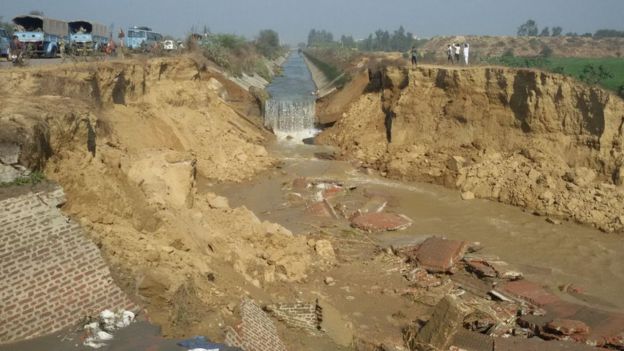
The Munak canal which was damaged by Jat protesters
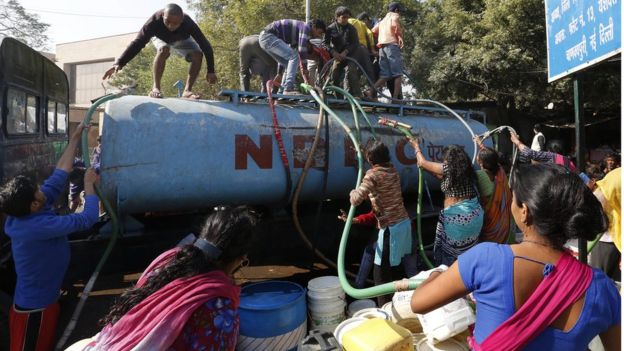
Millions in the Indian capital are without running water
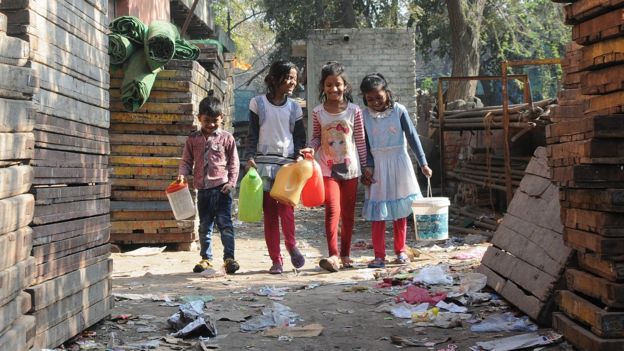
Families are dependent on tankers delivering water supplies
Delhi Chief Minister Arvind Kejriwal tweeted that the army was "trying to assess in how much time water would reach Delhi and whether any damage had been done to the canal".
Protesters went on the rampage despite a curfew and the deployment of the army, which is reported to have opened fire on them in the districts of Rohtak and Jhajjar.
Why are the Jats angry?
- The land-owning Jat community is relatively affluent and has traditionally been seen as upper caste.
- They are mainly based in Haryana and seven other states in northern India.
- Comprising 27% of the voters in Haryana and dominating a third of the 90 state assembly seats, they are a politically influential community. Seven of the 10 chief ministers in Haryana have been Jats.
- The Jats are currently listed as upper caste but the demonstrators have been demanding inclusion in caste quotas for jobs and education opportunities that have been available to lower castes since 1991.
- In March 2014 the Congress-led national government said it would re-categorise Jats as Other Backward Castes (OBC), opening the way to government job quotas.
- But India's Supreme Court ruled in 2015 that the Jats were not a backward community.
- As jobs have dried up in the private sector and farming incomes have declined, the community has demanded the reinstatement of their backward caste status to enable them to secure government jobs.
Haryana state minister Ram Bilas Sharma said the situation was returning to normal, traffic had resumed on national highways and that railway lines between Delhi and the cities of Jaipur and Chandigarh had reopened.
Mr Sharma also confirmed that the government would introduce a bill on reservations and quotas for the Jat community in the next assembly session, although he did not say when that would be.
Meanwhile, India's federal government has said it will set up a top-level committee to look into the grievances of Jats.
The violence had earlier forced the closure of several key roads and national highways, and paralysed the railway system in northern India.
Source: bbc.com
- Read more
-
22/Feb/2016
US-Based Ghanaian Arrested For Attempting To Smuggle Weapons To Ghana
A Charlotte man is facing federal charges after investigators said he attempted to smuggle weapons and ammunition into West Africa.
Richmond Attah, 30, was charged with one count of violating the Arms Export Control Act, one count of illegal firearms dealing, two counts of smuggling goods from the United States and four counts of making false statements to a firearms dealer, according to federal authorities.
Officials said between September 2013 and December 2015 Attah purchased approximately 63 firearms and 3,500 rounds of ammunition from various stores, Internet vendors and at gun shows. The indictment then states on Sept. 4, 2015, Attah travelled from Charlotte to Ghana.
Attah hid $30,100 in his luggage during his return trip, falsely declaring on customs paperwork that he was bringing $350 back into the United States, according to the charges.
Most recently, between November 2015 and December 2015, the indictment alleges Attah purchased 22 more firearms and ammunition from dealers in North Carolina.
Specifically, the indictment said Attah lied on his application and said the guns were for him when he purchased several of the weapons from Mount Holly Gun and Pawn.
A manager of the store told Channel 9 Attah actually bought the guns online and they simply handled the paperwork. The man added it did seem odd Attah purchased more than one of the same kind of weapon.
The court document goes on to state Attah then hid more than two dozen weapons and another 3,500 rounds of ammunition inside a washing machine and dryer and tried to have them shipped to Ghana. U.S. Customs found the weapons and ammunition before they were shipped out of the United States.
Attah was arrested from his place of employment Thursday, according his father.
Sampson Attah said federal agents came to their home looking for his son early that morning. Channel 9 spoke with him Thursday afternoon following his son’s arrest.
“Look at the door,” said Sampson Attah. “They broke through the house.”
Sampson Attah showed Channel 9 where federal agents broke through the front door of his home. The father said he came home to a slew of federal agents inside his home.
“My breakfast sandwich is still sitting on the table,” Sampson Attah pointed out. “I haven’t been able to eat all day.”
Sampson Attah said he’s shocked by the allegations and firmly denied any knowledge of the alleged gun trafficking scheme.
“If it is true, that he’s been doing this — not in this house,” said Sampson Attah.
Sampson Attah said agents searched his home but didn’t find anything.
“They took my cellphone and laptop. Everything was out and, oh, my God,” said Sampson Attah, shaking his head.
Sampson Attah said he and his family are from Ghana and that Richmond has lived with him here in Charlotte since 2003. When asked he said his son went to Ghana to visit his girlfriend. He said the couple share a child and has another one on the way.
“He’s a good man,” said Sampson Attah, again getting emotional. “He’s my son and I love him. I’m just praying God should intervene.” The father said he’s in the process of getting his son a lawyer. Richmond Attah made his first court appearance Thursday.
Source: peacefmonline.com
- Read more
-
22/Feb/2016
Islamic State militants in Libya 'threatened US interests'
Militants from the Islamic State group who were killed in a US air strike in Libya posed a threat to US and Western interests, the Pentagon says.
An IS camp was attacked in Sabratha, around 70km (43 miles) west of Tripoli.
The 38 people killed reportedly include Tunisian extremist Noureddine Chouchane, linked to two attacks in Tunisia last year, including one which killed 30 Britons.
The IS group has been active in Libya for more than a year.
The US estimates the group has up to 6,000 fighters there.
Pentagon spokesman Peter Cook said the strike was carried out "with the knowledge of Libyan authorities" but declined to confirm exactly who had been informed.
"We took this action against Sabir [Noureddine Chouchan] in the training camp after determining that both he and the ISIL [IS] fighters at these facilities were planning external attacks on US and other Western interests in the region," he was quoted by AFP news agency as saying.
"We see what's happening in Iraq and Syria and we believe that these fighters in Libya posed a threat to our national security interests."
Libya remains in chaos more than four years after the overthrow of former leader Muammar Gaddafi and is being fought over by a number of groups, including IS.
Efforts to agree on a unified government have so far been unsuccessful, with different authorities governing different parts of the country.
Top IS leaders 'take refuge' in Libya
Control and crucifixions: Life in Libya under IS
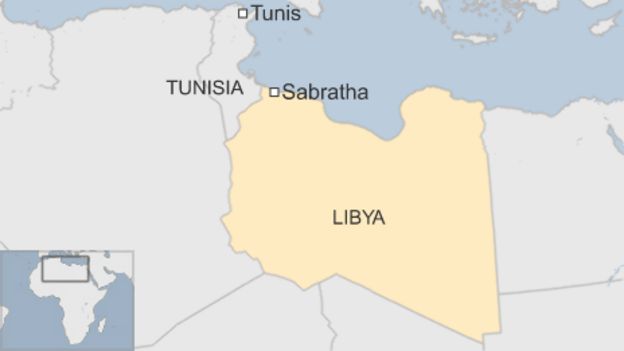
The Pentagon described Chouchane as an "experienced facilitator" who had helped move IS fighters across the Tunisia-Libya border.
American F-15E fighters as well as unmanned aircraft were involved in the raid, the Pentagon said.
The BBC understands that British bases were involved in the attack but no British assets, such as warplanes, were involved.
The mayor of Sabratha put the death toll at 41 and said the majority of those killed were Tunisians.
A statement on the council website said weapons such as machine-guns and rocket-propelled grenades had been found at the site.
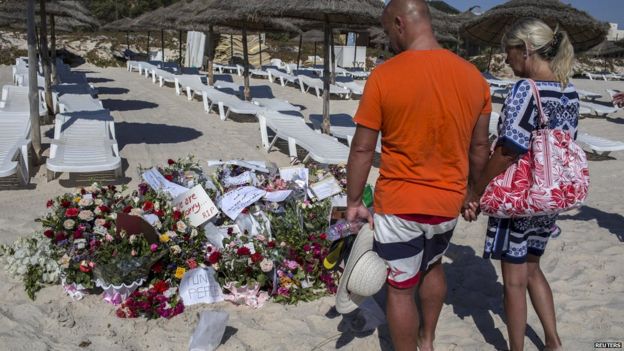
The Sousse attack last year left 30 Britons dead
In November, a US strike in Derna reportedly killed Iraqi IS commander Abu Nabil, also known as Wissam Najm Abd Zayd al-Zubaydi, who was said to be the group's leader in Libya.
The US has launched several unilateral raids and operations in the country since it helped oust Gaddafi.
In June, a gun attack in the Tunisian resort town of Sousse left 38 people dead, 30 of them Britons.
Chouchane is also believed to have been behind the attack on the Bardo Museum in Tunis last year, which left 19 people dead.
The gunmen in both the Sousse and Bardo attacks are believed to have trained in Libya, which shares a border with Tunisia.
Islamic State militants in Libya
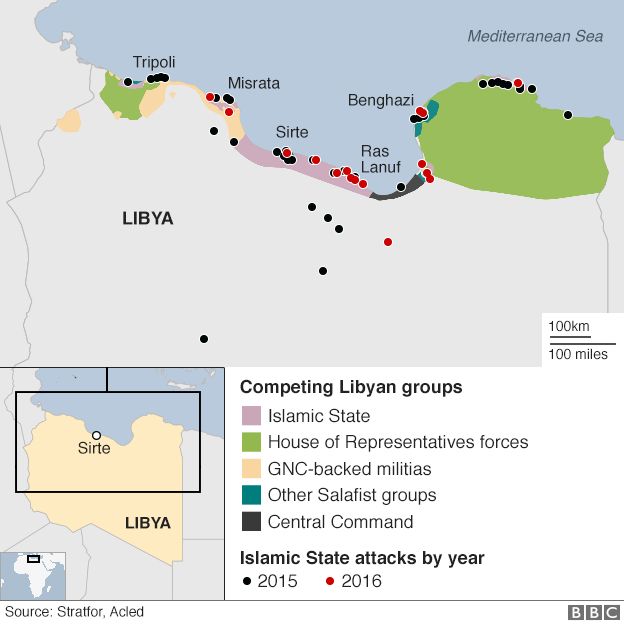
- IS jihadists seized a strip of land along Libya's coast, around the city of Sirte, last year
- Libyan intelligence officials say foreign fighters and some IS commanders have relocated there from Iraq and Syria
- The US estimates the number of IS foreign jihadists at 4,000-6,000
- The largest groups are said to be from Tunisia, Egypt, Sudan and Iraq
- Recent recruitment has focused on sub-Saharan African countries
- It is not known how many of the jihadists are nationals of European countries
- IS militants have attacked Libyan cities, including Tripoli and Benghazi, and oil installations
Source: bbc.com
- Read more
-
19/Feb/2016
Donald Trump demands Apple boycott to force it to unlock phone
US presidential candidate Donald Trump has called for a boycott of Apple until the tech giant helps unlock the iPhone of one of the San Bernardino killers.
Apple has clashed with the Justice Department (DoJ) over a court order forcing the company to help break the encryption on one of its phones.
On Friday the DoJ called Apple's refusal a "marketing strategy".
Apple said it will not help break into the the phone, citing wider privacy concerns for its users.
The phone belonged to one of the two people who opened fire at an office event in San Bernardino, California, last December, killing 14
Speaking at a campaign rally, Mr Trump said: "Boycott Apple until such time as they give that information."
On Thursday, a court ordered the tech giant to help break the encryption.
The government has called the request narrow and argued it is only focused on this particular iPhone.
The DoJ filed another motion in court on Friday after Apple's chief executive, Tim Cook, said Apple would continue to refuse the order.
A California court has set 22 March for the hearing.
Analysis: Dave Lee, BBC North America technology reporter
Before this goes to court, it's being played out with a war of words.
The DoJ motion today is about investigators smashing the ball back into Tim Cook's court. It disputes his claim that the security of its products would be inherently and forever compromised.
It essentially argues that Mr Cook's stance - and indeed the stance of the other technology companies that support him - is motivated by business, not ethics.
Apple has been given an extension to submit its formal response, but the real sparks are likely to fly at the hearing date set for late March.
It will take place in San Bernardino under, you'd imagine, the scrutiny of the families caught up in the tragedy.
In a letter to customers published on Apple's website, Mr Cook called the implications of the order "chilling".
"While we believe the FBI's intentions are good, it would be wrong for the government to force us to build a backdoor into our products. And ultimately, we fear that this demand would undermine the very freedoms and liberty our government is meant to protect."
Source: bbc.com
- Read more
-
19/Feb/2016
EU deal gives UK special status, says PM
David Cameron says a deal struck with EU leaders will give the UK "special status" and he will campaign with his "heart and soul" to stay in the union.
The PM said the agreement, reached late on Friday after two days of talks in Brussels, would include a seven-year "emergency brake" on welfare payments.
He added the deal included changes to EU treaties and would be presented to his cabinet on Saturday at 10:00 GMT.
EU exit campaigners said the "hollow" deal offered only "very minor changes".
The unanimous agreement reached at the EU summit was announced by European Council president Donald Tusk, who tweeted: "Deal. Unanimous support for new settlement for #UKinEU."
The new deal includes:
- Cuts in child benefit for the children of EU migrants living overseas - applicable immediately for new arrivals and from 2020 for the 34,000 existing claimants
- The amending of EU treaties to state explicitly that references to the requirement to seek ever-closer union "do not apply to the United Kingdom"
- An "emergency brake" on migrant workers' in-work benefits that will apply for seven years - less than the 13 years the PM proposed but longer than other countries had asked for
- The ability for the UK to enact emergency safeguards to protect the City of London
German Chancellor Angela Merkel predicted the package of reforms would "elicit support in the UK for the country to remain in the EU".
'In Britons' hands'
Mr Tusk said it "strengthens Britain's special status", while EU Commission president Jean-Claude Juncker described it as "fair".
Mr Tusk added: "We didn't walk away from the negotiating table. We were willing to sacrifice part of our interests for the common good, to show our unity.
"I deeply believe the UK needs Europe and Europe needs the UK. But the final decision is in the hands of the British people."
Once Mr Cameron has briefed his ministers at Saturday's cabinet meeting, they will be free to campaign for either side in the referendum, which has been promised by the end of 2017 but is expected in June this year.
Mr Cameron said he would shortly announce the date of the referendum and said he was "disappointed" but not surprised that one of his key allies, Justice Secretary Michael Gove, was to campaign for the UK to leave the EU.
Analysis by Laura Kuenssberg, BBC political editor
The ink is hardly dry on the UK's EU deal, but immediately the focus has switched to the substance of what David Cameron has achieved and - possibly an awkward question - how many of his colleagues will argue against him.
The focus will move to whether the prime minister can keep his party politely together during a period of public disagreement.
The ability to restrict benefits to migrants is an important victory for Mr Cameron - ammunition for his argument that he has achieved changes to help reduce the number of EU migrants coming to live and work in the UK.
The proposals are complicated and do not exactly match the promises he made in the Conservative Party manifesto.
But with it - and the other commitments - it becomes harder for his critics to make the case that the agreement is flimsy and will change nothing.
Mr Cameron said he had achieved the reforms he wanted, claiming they would put the UK "in the driving seat" of one of the world's biggest markets and create a "more flexible" EU.
"We have permanently protected the pound and our right to keep it," he added, saying that, for the first time, the EU "has explicitly acknowledged it has more than one currency".
"The British people must now decide whether to stay in this reformed European Union or to leave," he continued.
"This will be a once-in-a-generation moment to shape the destiny of our country."
At the same time as the EU reforms, the PM said further measures to strengthen the UK's sovereignty would be announced.
The deal reached between all 28 EU member states comes after several leaders objected to Mr Cameron's planned reforms.
The original aim had been to conclude the deal at an "English breakfast" meeting on Friday, which became an "English brunch", then an "English lunch" and eventually an "English dinner", at which point the agreement was announced.
Eurosceptics have dismissed the reforms, saying they will not allow the UK to block unwanted EU laws or reduce migration.
Matthew Elliott, chief executive of the Vote Leave campaign, said Mr Cameron "will now declare victory but it is an entirely hollow one".
He disputed the PM's claim that the deal was legally binding, saying it "can be ripped up by EU politicians and unelected EU judges".
As the EU summit was being concluded, another EU exit campaign, Grassroots Out, held a rally in Westminster.
Conservative MP David Davis said it was time for Britain "to take control of its own destiny", while UKIP leader Nigel Farage said the cross-party campaign was "absolutely united in fighting to get back our democracy".
Mr Farage unveiled former Respect MP George Galloway as a "special guest" at the rally, describing him as a "towering figure on the left of British politics".
Analysis by Laurence Peter, BBC News online
After two days of gruelling talks - and late-night haggling - EU leaders were plainly relieved to get the deal with David Cameron done.
French President Francois Hollande stressed that "no revision of the treaties is planned". Tough EU treaty change would have been politically toxic for him, as he is faced with an election next year.
But he also stressed that for France the EU "is not just a budget" - but about many policies and "the joint project". It was a pointed reminder about the EU's symbolism, contrasting with Mr Cameron's position.
German Chancellor Angela Merkel said the new child benefit rules could be good for Germany too - and supported Mr Cameron's drive against abuse of the welfare system.
"I don't think we gave the UK too much," she said. But she admitted that ever closer union was an emotional issue for her, so Mr Cameron's opposition to it was "not easy" to deal with.
Source: bbc.com
- Read more
-
19/Feb/2016
Nigeria to probe generals over arms fraud
Twelve senior Nigerian army officers have been handed over to the anti-corruption agency for their alleged involvement in an arms scandal.
The army did not name them, but said they included six serving generals.
If the Economic and Financial Crimes Commission (EFCC) finds enough evidence against them, they would be tried in a military court, the army said.
A presidential inquiry last year found that fake contracts worth $2bn (£1.3bn) were awarded by last administration.
It alleged that the money, which was meant to buy arms to fight the Islamist Boko Haram group, has gone missing.
The former national security adviser, Sambo Dasuki, was charged in December in connection with the case involving $68m that is alleged to be missing. He was accused of awarding phantom contracts to buy helicopters, fighter jets and ammunition, which he denied.
Army spokesman Colonel Sani Usman said the 12 officers referred to the EFCC included three serving major generals, one retired major general, three brigadier generals, four colonels and a lieutenant colonel.
The army's announcement follows President Muhammadu Buhari's order last month to investigate 20 former military chiefs and officers over the alleged arms procurement fraud.
Suspects released
Several close associates of former President Goodluck Jonathan are also facing trial in connection with the scandal.
During the fight against Boko Haram, many soldiers reported that they did not have enough equipment to take on the insurgents.
Mr Buhari, who came to power last May, was largely elected on a promise to tackle corruption.
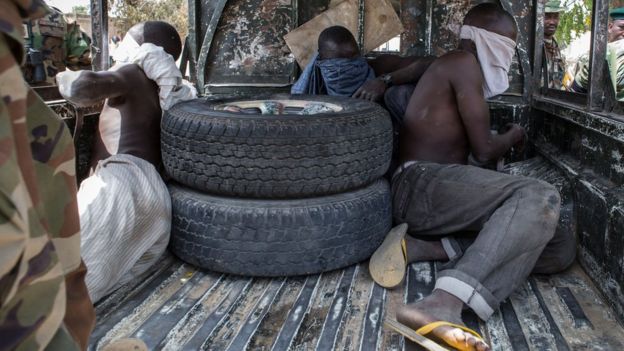
The military denies allegations that it is maltreating detainees
Meanwhile the army has released 275 people arrested on suspicion of being members of Boko Haram in the north-eastern Borno state after they were found to have no links with the Islamist group.
They included 142 men, 49 women, 22 boys and 50 girls, a spokesman for the state governor, Usman Kumo, told the BBC Hausa service.
It is not clear how long they were in detention.
Last year, Amnesty International accused the military of maltreating detainees and said since 2011 more than 8,000 people had died in custody during the fight against Boko Haram.
Earlier this month, the UK-based campaign group criticised the reinstatement of an army general it accuses of committing war crimes.
The military said the allegations were being investigated.
- Read more
-
13/Feb/2016
Al-Shabab 'carried out' Somalia plane attack
Somalia's Islamist militant group al-Shabab says it carried out a bomb attack on a plane that blew a huge hole in its fuselage earlier this month.
In an emailed statement, al-Shabab said the attack was revenge for Western intelligence operations in Somalia.
The Daallo Airlines Airbus 321 with 74 passengers on board made an emergency landing in the capital Mogadishu after the explosion shortly after take-off.
One person, said to be the bomber, was reportedly blown out of the plane.
The explosion happened about 15 minutes into the flight, when the plane was only at around 11,000ft (3,350m) and the cabin was not yet pressurised.
Most of the passengers had originally been booked on a Turkish Airlines flight but the flight was cancelled due to bad weather a few hours before take-off, Turkish Airlines said.
In its statement, al-Shabab said it had targeted Turkish Airlines because it said the Nato state was supporting Western operations in Somalia.
But the group admitted it had failed in its aim of bringing down the flight.
Somali authorities have released a video showing a passenger being given a laptop that they believe contained the bomb.
In the video, a man in an orange hi-visibility vest is shown walking with a man in a blue shirt holding what looks like a laptop. Another man in a hat approaches them and it is alleged that the laptop is handed over.
More than 20 people have been arrested in connection with the incident, the Somali government said.
Source: bbc.com
- Read more
-
13/Feb/2016
Syria conflict: Pressure grows on Russia over civilian bomb deaths
Pressure is increasing on Russia over civilian deaths in Syria, with France and the US urging greater caution.
French PM Manuel Valls and US Secretary of State John Kerry said civilians were dying in Russian air strikes.
Russian PM Dmitry Medvedev said there was "no evidence of our bombing civilians, even though everyone is accusing us of this".
One observers' group says at least 1,015 civilians have been killed in Russian air strikes.
The UK-based Syrian Observatory for Human Rights said late last month that close to a quarter of those killed were under the age of 18.
How Putin is succeeding in Syria
Displaced Syrians struggle to survive
Syria: The story of the conflict
Russia, an ally of Syrian President Bashar al-Assad, has consistently denied hitting civilian targets and insists it is battling terrorists.
Mr Valls said his government "respects Russia and Russia's interests" but "that to re-discover the path to peace, to discussion, the Russian bombing of civilians has to stop".
Mr Kerry again accused Russia of using so-called 'dumb bombs' in Syria that do not hit precise targets. Last week, he said women and children were being killed "in large numbers" by Russian raids.
Mr Medvedev said Russia was "not trying to achieve some secret goals in Syria", adding that "we are trying to protect our national interests".
Their comments were made at a security conference in Munich, days after world powers agreed a deal to push for a cessation of hostilities in Syria within a week.
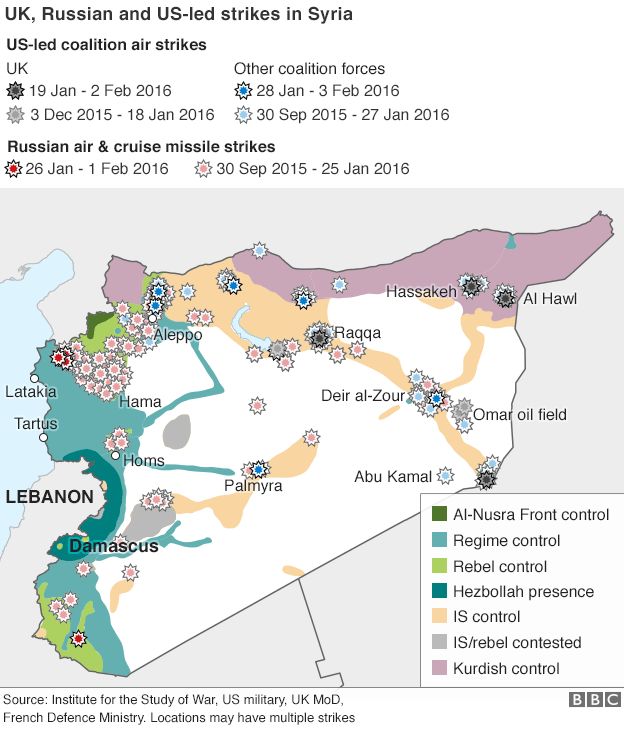
Agreement to try to bring about a cessation of hostilities and allow more access for humanitarian aid was reached by world powers late on Thursday in Germany, but neither the Syrian government nor the rebels were involved.
Under the plan, efforts will be made to try to make urgent aid deliveries to besieged and hard-to-reach areas in Syria. Steps will also be taken to work towards an eventual ceasefire and implementation of a UN-backed plan for political transition in Syria.
The halt will not apply to the battle against jihadist groups Islamic State (IS) and al-Nusra Front.
Assad 'deluded'
However, the metaphorical ink was barely dry on the deal before the obstacles to a Syrian ceasefire popped up, one after another, the BBC's security correspondent Frank Gardner reports.
From watching the various speeches at the Munich conference, it is clear that when it comes to ending the Syrian conflict the Russian and Western positions appear to be as far apart as ever, our correspondent reports.
Rebel groups in Syria have told the BBC they would not stop fighting because they do not believe that Russia will end its bombing campaign in support of the government.
They also reiterated their demand that President Assad be removed from power. On Friday, the president said he wanted to retake "the whole country" from rebels.
But US state department spokesman Mark Toner said Mr Assad was "deluded" if he thought there was a military solution to the conflict.
Syrian government forces, backed by Russian air strikes, have almost encircled rebels in parts of the northern city of Aleppo.
More than 250,000 people have been killed and some 11 million displaced in almost five years of fighting in Syria.
On Saturday, Turkey's Foreign Minister Mevlut Cavusoglu said Saudi Arabia would send war planes to the Turkish air base of Incirlik, from where they would attack militants in Syria from the so-called Islamic State.
Saudi Arabia is already part of the international coalition against IS.
Mr Cavusoglu also said it was possible that troops from his country and Saudi Arabia might participate in a ground operation against IS forces. The US has so far ruled out a ground invasion.
Moscow has warned against any new foreign ground intervention in the country, saying such a development could even lead to a world war.
Syria conflict - key questions
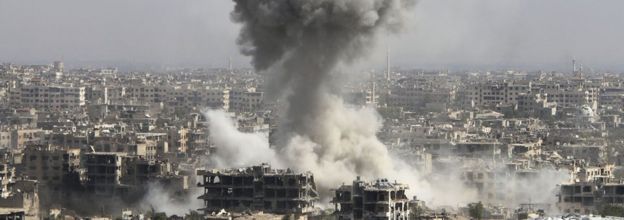
Why is there a war in Syria?
Anti-government protests developed into a civil war that, five years on, has ground to a stalemate, with the Assad government, Islamic State, an array of Syrian rebels and Kurdish fighters all holding territory.
Who is fighting whom?
Government forces concentrated in Damascus and the centre and west of Syria are fighting the jihadists of Islamic State and al-Nusra Front, as well as less numerous so-called "moderate" rebel groups, who are strongest in the north and east. These groups are also battling each other.
How has the world reacted?
Iran, Russia and Lebanon's Hezbollah movement are propping up the Alawite-led Assad government, while Turkey, Saudi Arabia and Qatar back the Sunni-dominated opposition, along with the US, UK and France. Hezbollah and Iran are believed to have troops and officers on the ground, while a Western-led coalition and Russia are carrying out air strikes.
Source: bbc.com
- Read more
-
13/Feb/2016
Case On Appointment Of Judges, EC Chair Adjourned To March 2
The Supreme Court has adjourned to March 2 2016, the petition brought before it by the Ghana Bar Association (GBA) challenging the appointment of two judges to the nation’s apex court, and two others, also challenging the appointment of a chair for the Electoral Commission.
The case has been adjourned to allow all the parties to file a joint memorandum for the court to make a determination on the cases.
A Ghanaian citizen, Richard Dela Sky, has also filed a writ at the Supreme Court asking the court to interpret provisions of the 1992 Constitution on the appointment of an Electoral Commission chair.
Mr. Sky is hopeful that a positive outcome of the case will define a clear path that President John Mahama, and all future Presidents, must navigate in making appointments to the Electoral Commission.
Mr. Danso Acheampong, has also filed a suit seeking interpretation on some appointments to the EC.
Source: citifmonline.com
- Read more
-
10/Feb/2016
We´re Breaking Away From Ghana – Volta Group
A group known as the Homeland Study Group Foundation based in Ho is demanding the secession of the Volta Region and parts of the Northern and Upper East Regions from Ghana to become the Western Togoland state as soon as possible.
The demand runs contrary to the prevailing international order of globalisation which rather facilitates the integration of states and nations into political and economic blocs.
In an argument, the group claimed that residents of the Western Togoland voted to become a union with the Gold Coast (now Ghana) but the union had not been established up till now and that Ghana opted to be a unitary state under the plebiscite in 1956 [referendum] to be in union with a common constitution with the WesternTogoland and the Gold Coast but there had been no unionized constitution up to date.
The group further claimed that the Western Togoland was not incorporated in the act establishing the Gold Coast by Queen Elisabeth of the United Kingdom.
The need for sovereignty
It therefore called for the declaration of Western Togoland which is perceived as stretching from Kulungugu in the Upper East Region to Keta in the Southern coast by the Atlantic ocean as a sovereign state.
According to the group the Gold Coast voted to be a unitary state on July 12, 1956 while the Western Togoland voted to be in union with Ghana on July 9, 1956 and that the union had not been established till now.
The group claimed that the size of Eastern Togoland was 22,000 square miles and the Western Togoland as 12,600 square miles.
Speaking exclusively to Graphic Online at the sidelines of the annual congress and lecture of the homeland study group at the auditorium of the Volta Regional House of Chiefs in Ho, the chairman and convenor of the secessionist group , Mr Charles Kormi Kudjordjie, said the group had no intention of creating any turmoil in the country and that the agitation was to be pursued in a peaceful manner.
”This is the beginning of the united effort of exerting final pressure to extricate ourselves from over 50 years span of un-established union with Ghana which has not yielded any benefits - social, economic and financial security to the common people of the land," Mr Kudjordjie stated.
“The time is now to execute a common plan of action to come out of serfdom as some wise men and women did before under various autocracies the world over. Our wise men and women are again ready to strategise for the formula for coming out of the serfdom sooner than later. This congress is the launch pad for the missile attack at all fronts for independence. Whether it is here now, today, tomorrow is matter of choice that must not be delayed, but pursued vigorously”, Mr Kudjordjoe declared.
He said the group was positioned to avoid all errors of misrule of former affiliation and assured that there was enough capital, human and material resources to plan policies towards better technological skilled manpower development for brighter economic attainment of the new state.
Mr Kudjordjie said the people of Western Togoland had no legal basis to be part of Ghana and that the time to act was now to save the future generation.
In a welcoming address, the vice chairman of the homeland study group, Mr Gotthold Yao Agra, said the Western Togoland was clandestinely removed at all levels of education in Ghana with the view to creating a vacuum that will consume the identity as a state among United Nations, African Union and the Economic Community of West African States(ECOWAS ) and other international organisations.
He, therefore, said the restoration of the state of Western Togoland was in tandem with the restoration of history and subsequent restoration of the legitimate state which had lingered over the years that had remained for over 100 years.
More than 35 delegates came from Adidome, Kpando, Tsito, Dzodze, Ho, Juapong, Amedzofe, Lume, Wheta, Klikor, Damabai, Aflao and Kadjebi.
Source: Graphic.com.gh
- Read more
-
09/Feb/2016
Smarttys Pays First Installment Of Refund Cash
Smarttys Management and Production Limited has paid the first instalment of the refunds in connection with the rebranding of 116 Metro Mass Transit (MMT) buses by the Ministry of Transport.
The branding of the buses was done at a cost of GH¢3.6 million.
A letter signed by lawyer for Smarttys Management and Production Limited, Mr Kissi Agyebeng, to which the cheque paid into the account of the Economic and Organised Crime Office (EOCO) was attached said, “See attached a cheque intended as the settling of the agreed first instalment of three hundred thousand cedis drawn on the client’s account of Cromwell Gray LLP.”
The letter made reference to the Attorney General’s letters of December 29, 2015 and January 7, 2016, on the refunds to be made, and also made reference to modes of payment reached.
Modes of payment
The letter of January 7, 2016 by the Attorney General and Minister of Justice, Ms Marietta Brew Appiah-Oppong, which was addressed to Mr Kissi Agyebeng said a figure of GH¢1,548,608.04 had been arrived at as the amount to be refunded by Smarttys Management and Production Limited.
“In consultation with the Ministry of Transport and the Ministry of Finance, this amount was arrived at taking into consideration the following factors raised in your letter, revised value added tax position, revised withholding tax position and a set off of GH¢27,173.74 withholding tax over deductions,” the letter added.
The letter indicated the acceptance of the request to pay the revised amount in full on or before March 31, 2016.
It said interest on the revised amount would be frozen subject to Smarttys Management and Production Limited making full payment of an amount between GH¢300,000 on or before January 29, 2016.
“The remainder to be paid in two equal instalments on or before February 29, 2016 and March 31, 2016, respectively,” the letter said.
It directed that all payments should be made by cheque in the name of EOCO.
“Please be advised that government reserves the right to take all relevant actions or steps to recover all moneys owed together with interest accrued calculated at the prevailing bank rate from 29th January 2016 till date of final payment if you fail to make payment within the stipulated time,” the letter said.
Context
The branding of the new Chinese Huanghai buses for the MMT with portraits of John Mahama and past presidents caused public outcry, resulting in the resignation of the Minister of Transport, Ms Dzifa Attivor, in December.
Subsequently, the Chief of Staff, Mr Julius Debrah, ordered the Attorney General to probe the contract and report back to him.
The Attorney General presented her report on December 22, 2015, directing the refunding of money found to have been overpaid to Smarttys in the contract.
Source: Daily Graphic
- Read more
-
09/Feb/2016
Obama climate initiative: Supreme Court calls halt
President Barack Obama's plans to regulate emissions of carbon dioxide from US power plants have been stalled by the US Supreme Court.
The court ruled that the president's Clean Power Plan could not go forward until all legal challenges were heard.
Designed to cut US emissions by 32% by 2030, the scheme put huge emphasis on a shift to renewable energy.
It formed the key element of the US pledge at UN climate negotiations held in Paris in December last year.
Introduced by the president last August, the plan set carbon reduction goals for each state and it was up to the states themselves to come up with proposals to meet those goals.
A group of 27 states, utilities and coal miners sought to block the proposal in the courts. They argued that the plan was an infringement on states' rights.
An initial attempt to halt the implementation of the plan until legal challenges were heard was thrown out by a US appeals court in Washington in January.
However the Supreme Court voted 5-4 to suspend the plan pending the outcome of the litigation.
White House 'disagrees' with ruling
White House spokesman Josh Earnest put out a statement following the decision:
"We disagree with the Supreme Court's decision to stay the Clean Power Plan while litigation proceeds.
"The Clean Power Plan is based on a strong legal and technical foundation, gives states the time and flexibility they need to develop tailored, cost-effective plans to reduce their emissions, and will deliver better air quality, improved public health, clean energy investment and jobs across the country, and major progress in our efforts to confront the risks posed by climate change.
"We remain confident that we will prevail on the merits."
The ruling could have significant implications for the president's attempt to cut down on carbon.
Under the Clean Power Plan, individual states were due to submit their proposals on how to meet the CO2 restrictions by September this year. That date will be missed.
It is unlikely that all the legal questions over the future of the Clean Power Plan will be resolved before President Obama leaves office next January.
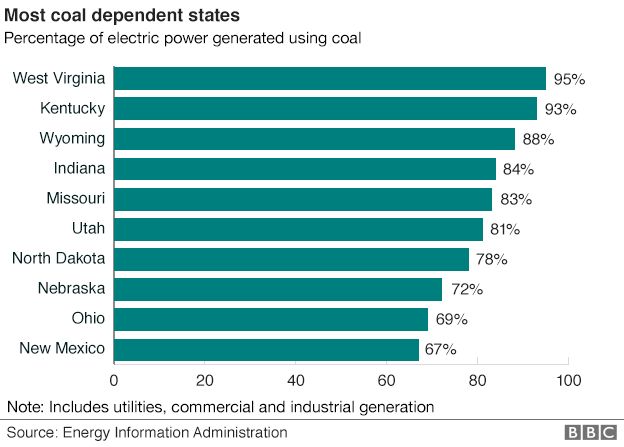
West Virginia's Attorney General Patrick Morrisey called the high court's action a "great victory".
"We are thrilled that the Supreme Court realized the rule's immediate impact and froze its implementation, protecting workers and saving countless dollars as our fight against its legality continues," he said in a statement.
Supporters of the Clean Power Plan were confident that the courts would ultimately upheld its legality.
"The electricity sector has embarked on an unstoppable shift from its high-pollution, dirty-fuelled past to a safer, cleaner-powered future, and the stay cannot reverse that trend," said David Doniger, from the Natural Resources Defense Council.
"Nor can it dampen the overwhelming public support for action on climate change and clean energy."
The ruling will be seen as a major embarrassment for President Obama, who helped craft a new global agreement on climate change at UN sponsored talks in Paris in December.
What will worry the White House more is the division of the court along ideological lines, with conservative justices all supporting the stay while the liberal justices opposed.
If these divisions hold, the Clean Power Plan may suffer further setbacks in the Supreme Court which may ultimately render it useless.
If that was to happen, the ability of the US to live up to its commitments under the Paris Climate Agreement would be in serious doubt.
Source: bbc.com
- Read more
-
09/Feb/2016
'We are not criminals' Nigerians tell their president
It's the home of the "419" scam - the infamous online swindle named after a Nigerian anti-fraud law - and it's no secret that this country's international reputation has been tainted by allegations of criminality.
But it's not something Nigerians expected to hear from the mouth of their president himself, especially while he was on an official visit to the UK.
In an interview with the Telegraph newspaper, President Muhammadu Buhari said that Nigerians abroad have "made it difficult for Europeans and Americans to accept them because of the number of Nigerians in prisons all over the world accused of drug trafficking or human trafficking."
"We have an image problem abroad," he said. "And we are on our way to salvage that. We will encourage our countrymen to stay at home, work hard and make a respectable living at home."
Nigerians reacted to his remarks by the thousand - with rage, humour and some insightful self-reflection too.
Opposition senator Ben Bruce-Murray was one of the first to respond, urging people to get the hashtag #IamANigerianNotACriminal trending.
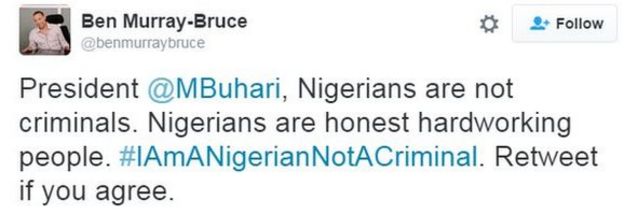
That hashtag rapidly evolved into the snappier #NigeriansAreNotCriminals which was used more than 35,000 times in a couple of days. There were a slew of tweets criticising the president for slandering the reputation of his own people.

It's a thorny issue for Nigerians living abroad who feel they sometimes have to deal with stricter immigration checks and visa restrictions than people from other parts of the world. And some who believe they face heavier oversight and regulation when it comes to working in the banking and finance sectors because of their nationality.
Nigeria is in the middle of an economic crisis. Dropping oil prices mean there is less money around for investment and the value of the naira is falling rapidly.
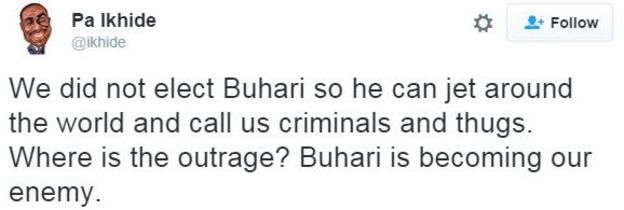
And Nigerians feel that in many respects the reputation just isn't justified. According to UK police statistics, shared by Senator Murray-Bruce, Nigerians in the UK have faced fewer arrests than immigrants from other, smaller European countries.
Despite the backlash, there was some support for what President Buhari said. The president has a reputation for plain speaking. He was voted into power last year, in a mostly fair election, on a platform of fighting corruption. As an army general in 1984 Buhari overthrew a civilian government, replacing it with a military dictatorship and made a promise to stamp out "indiscipline". He was overthrown not long after. But his reputation survived.
Some are calling this a gaffe but so far the president has made no effort to backtrack on what he said.
Source: bbc.com
- Read more
-
09/Feb/2016
Mali: landmine 'kills 3 soldiers' in central Mopti
Three Malian soldiers were killed when their vehicle hit a landmine in the central region of Mopti, officials say.
Two others were wounded and taken to a hospital, the defence ministry said in a statement.
No group has claimed responsibility for the device.
Mali has been threatened by various armed groups and has fought Islamist rebels in the north for a number of years.
The incident happened in Mondoro, next to the border with Burkina Faso, the statement said.
Why Mali is an insurgent hotspot
Al-Qaeda-linked militants have been fighting the army in northern Mali and France, the former colonial power in the country, intervened in January 2013 to stop their advance south to the capital.
But attacks across the country have increased recently, including a shooting at a hotel in the capital, Bamako, that left 22 people dead in November.
Militancy in Mali
- October 2011: Ethnic Tuaregs launch rebellion after returning with arms from Libya
- March 2012: Army coup over government's handling of rebellion; a month later Tuareg and al-Qaeda-linked fighters seize control of north
- June 2012: Islamist groups capture Timbuktu, Kidal and Gao from Tuaregs, start to destroy Muslim shrines and manuscripts and impose Sharia
- January 2013: Islamist fighters capture a central town, raising fears they could reach Bamako. Mali requests French help
- July 2013: UN force, now totalling about 12,000, takes over responsibility for securing the north after Islamists routed from towns
- July 2014: France launches an operation in the Sahel to stem jihadist groups
- Attacks continue in northern desert area, blamed on Tuareg and Islamist groups
- 2015: Terror attacks in the capital, Bamako, and central Mali
Source: bbc.com
- Read more
-
09/Feb/2016
US President Obama signs Africa electricity plan into law
US President Barack Obama has signed into law an initiative aimed at bringing electricity to 50 million people in sub-Saharan Africa by 2020.
The Electrify Africa Act of 2015 will give legal backing to Mr Obama's flagship Power Africa scheme, which is trying to improve access to electricity through public-private partnerships.
It took nearly two years to be passed in both houses of the US Congress.
About two-thirds of people in Africa do not have access to reliable power.
Observers say the new legislation is likely to ensure that the scheme continues even after Mr Obama leaves the White House in 2017.
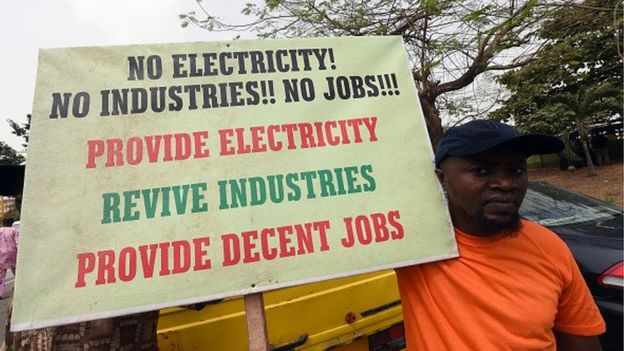
Many Nigerians are forced to rely on generators for their electricity supply
The scheme has set itself the long-term target of doubling electricity access in sub-Saharan Africa.
The legislation would "improve the lives of millions in sub-Saharan Africa by helping to reduce reliance on charcoal and other toxic fuel sources that produce fumes that kill more than HIV/Aids and malaria combined," said House Foreign Affairs committee chairman Ed Royce, a long-time supporter of the initiative.
It would also "promote the development of affordable and reliable energy", he added, in a statement on Monday.
Management consultant firm McKinsey estimates that it will cost $835bn (£575bn) to connect the entire continent's population to electricity by 2030.
Aside from the US government, African governments, development partners, and the private sector are all involved in the Power Africa scheme.
The US government has made financial commitments of $7bn to support the scheme, which it says in turn has drawn a further $43bn in investment pledged from other public and private partners.
Source: bbc.com
- Read more
-
09/Feb/2016
About Us
-
Archives
Recent posts
News for people who want to know
- Bakus Radio resource for |Ghana & Africa music |News |Entertainment |Sports | Copyright © 2016 . All Rights Reserved.
- Designed By Fresco Software Solution Pvt. Ltd.



























